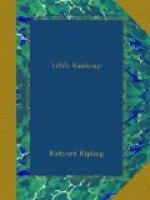‘Then,’ croaked the Mullah, ’thou wilt take out the young men and strike at the four villages within the Border?’
’Or wring thy neck, black raven of Jehannum, for a bearer of ill-tidings.’
Khoda Dad Khan oiled his long locks with great care, put on his best Bokhara belt, a new turban-cap and fine green shoes, and accompanied by a few friends came down from the hills to pay a visit to the new Deputy Commissioner of Kot-Kumharsen. Also he bore tribute—four or five priceless gold mohurs of Akbar’s time in a white handkerchief. These the Deputy Commissioner would touch and remit. The little ceremony used to be a sign that, so far as Khoda Dad Khan’s personal influence went, the Khusru Kheyl would be good boys,—till the next time; especially if Khoda Dad Khan happened to like the new Deputy Commissioner. In Yardley-Orde’s consulship his visit concluded with a sumptuous dinner and perhaps forbidden liquors; certainly with some wonderful tales and great good-fellowship. Then Khoda Dad Khan would swagger back to his hold, vowing that Orde Sahib was one prince and Tallantire Sahib another, and that whosoever went a-raiding into British territory would be flayed alive. On this occasion he found the Deputy Commissioner’s tents looking much as usual. Regarding himself as privileged he strode through the open door to confont a suave, portly Bengali in English costume writing at a table. Unversed in the elevating influence of education, and not in the least caring for university degrees, Khoda Dad Khan promptly set the man down for a Babu—the native clerk of the Deputy Commissioner—a hated and despised animal.
‘Ugh!’ said he cheerfully. ‘Where’s your master, Babujee?’
‘I am the Deputy Commissioner,’ said the gentleman in English. Now he overvalued the effects of university degrees, and stared Khoda Dad Khan in the face. But if from your earliest infancy you have been accustomed to look on battle, murder, and sudden death, if spilt blood affects your nerves as much as red paint, and, above all, if you have faithfully believed that the Bengali was the servant of all Hindustan, and that all Hindustan was vastly inferior to your own large, lustful self, you can endure, even though uneducated, a very large amount of looking over. You can even stare down a graduate of an Oxford college if the latter has been born in a hothouse, of stock bred in a hothouse, and fearing physical pain as some men fear sin; especially if your opponent’s mother has frightened him to sleep in his youth with horrible stories of devils inhabiting Afghanistan, and dismal legends of the black North. The eyes behind the gold spectacles sought the floor. Khoda Dad Khan chuckled, and swung out to find Tallantire hard by. ‘Here,’ said he roughly, thrusting the coins before him, ’touch and remit. That answers for my good behaviour. But, O Sahib, has the Government gone mad to send a black Bengali dog to us? And am I to pay service to such an one? And are you to work under him? What does it mean?’ ‘It is an order,’ said Tallantire. He had expected something of this kind. ’He is a very clever S-sahib.’




